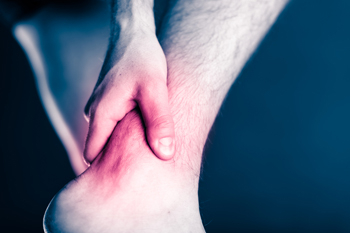 Achilles tendon injuries often occur due to overuse, sudden increases in physical activity, or inadequate warm-ups before exercise. This tendon, connecting the calf muscles to the heel bone, endures significant stress, especially during activities like running, jumping, or abrupt changes in direction. Such strain can lead to inflammation, known as tendinitis, or even a partial or complete tear. When an Achilles tendon injury happens, individuals typically experience sharp pain or a snapping sensation in the back of the ankle, followed by swelling and difficulty walking. The pain may worsen with activity and improve with rest but can become chronic if untreated. Treatment includes rest and anti-inflammatory medications to reduce pain and swelling. Exercises can help strengthen the tendon and restore flexibility. In severe cases, immobilization or surgery might be necessary. To prevent these injuries, it is important to engage in proper warm-ups, gradually increase activity levels, and wear supportive footwear. If you have Achilles tendon pain, it is suggested that you schedule an appointment with a podiatrist for a proper diagnosis and tailored treatment plan.
Achilles tendon injuries often occur due to overuse, sudden increases in physical activity, or inadequate warm-ups before exercise. This tendon, connecting the calf muscles to the heel bone, endures significant stress, especially during activities like running, jumping, or abrupt changes in direction. Such strain can lead to inflammation, known as tendinitis, or even a partial or complete tear. When an Achilles tendon injury happens, individuals typically experience sharp pain or a snapping sensation in the back of the ankle, followed by swelling and difficulty walking. The pain may worsen with activity and improve with rest but can become chronic if untreated. Treatment includes rest and anti-inflammatory medications to reduce pain and swelling. Exercises can help strengthen the tendon and restore flexibility. In severe cases, immobilization or surgery might be necessary. To prevent these injuries, it is important to engage in proper warm-ups, gradually increase activity levels, and wear supportive footwear. If you have Achilles tendon pain, it is suggested that you schedule an appointment with a podiatrist for a proper diagnosis and tailored treatment plan.
Achilles tendon injuries need immediate attention to avoid future complications. If you have any concerns, contact one of our podiatrists of Southwest Podiatry. Our doctors can provide the care you need to keep you pain-free and on your feet.
What Is the Achilles Tendon?
The Achilles tendon is a tendon that connects the lower leg muscles and calf to the heel of the foot. It is the strongest tendon in the human body and is essential for making movement possible. Because this tendon is such an integral part of the body, any injuries to it can create immense difficulties and should immediately be presented to a doctor.
What Are the Symptoms of an Achilles Tendon Injury?
There are various types of injuries that can affect the Achilles tendon. The two most common injuries are Achilles tendinitis and ruptures of the tendon.
Achilles Tendinitis Symptoms
- Inflammation
- Dull to severe pain
- Increased blood flow to the tendon
- Thickening of the tendon
Rupture Symptoms
- Extreme pain and swelling in the foot
- Total immobility
Treatment and Prevention
Achilles tendon injuries are diagnosed by a thorough physical evaluation, which can include an MRI. Treatment involves rest, physical therapy, and in some cases, surgery. However, various preventative measures can be taken to avoid these injuries, such as:
- Thorough stretching of the tendon before and after exercise
- Strengthening exercises like calf raises, squats, leg curls, leg extensions, leg raises, lunges, and leg presses
If you have any questions please feel free to contact our offices located in Dallas, and Carrollton, TX . We offer the newest diagnostic tools and technology to treat your foot and ankle needs.
